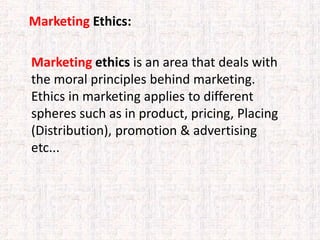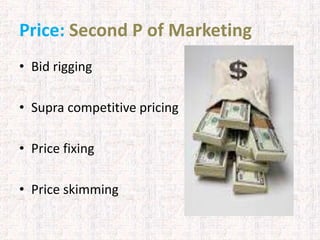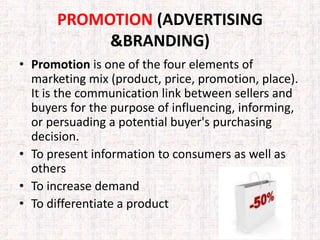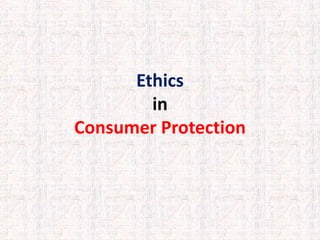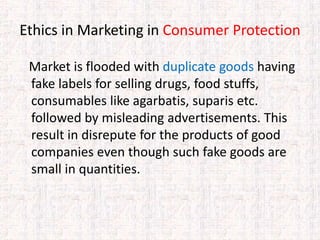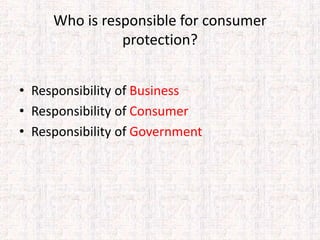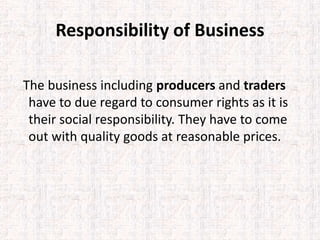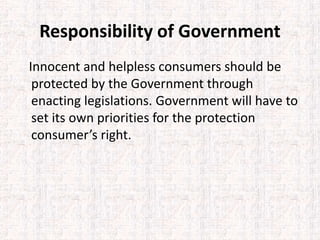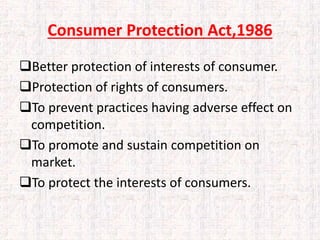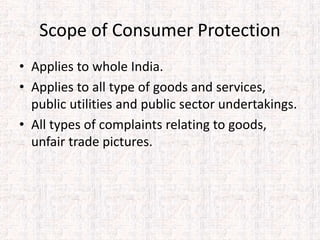Ethics in Marketing
- 1. WELCOM E
- 2. Prepared By:- • Mohit Mahajan
- 4. What is ethics? Ethics is the art and science of determining good and bad or right and wrong moral behavior of a single or group of people.
- 5. What is MARKETING? Marketing is the science and art of exploring, creating, and delivering value to satisfy the needs of a target market at a profit. - Philip Kotler
- 6. Marketing Ethics: Marketing ethics is an area that deals with the moral principles behind marketing. Ethics in marketing applies to different spheres such as in product, pricing, Placing (Distribution), promotion & advertising etc...
- 7. Why we need Ethics in Marketing? There are many reasons but will notify some: • When an organization behaves ethically, customers develop more positive attitudes about the firm, its products, and its services. • To create Values or trust with key stakeholders • To build good image about the organization in the minds of customer, employees, shareholders and the society.
- 8. Ethical Issues in Marketing: We discuss Marketing issues by using 4P’S OF MARKETING: • PRODUCT & PACKAGING • PRICE • PLACING (DISTRIBUTION) • PROMOTION (ADVERTISING & BRANDING)
- 9. Product • Consumer safety • Product liability and reliability • Designing for special needs
- 10. Packaging Label information Packaging graphics Packaging safety Environmental implication of packaging
- 11. Price: Second P of Marketing • Bid rigging • Supra competitive pricing • Price fixing • Price skimming
- 12. PLACING (DISTRIBUTION) Product distribution (or place) is one of the four elements of the Marketing MIX. Distribution of product or service is transporting them from manufacture to stockiest, wholesalers, retailer and then to consumers.
- 13. Unethical Practices Many retailers sell products that have crossed expiry date is unethical. Exerting influence to cause vendors to reduce display space for competitors' products is unethical. Promising shipment when knowing delivery is not possible by the promised date is also unethical.
- 14. Paying vendors to carry a firm's product rather than one of its competitors are also unethical. Most drug stores would give too many drugs without prescription from a qualified doctor are also unethical. Products are moved in unsafe vehicles ,are also unethical.
- 15. PROMOTION (ADVERTISING &BRANDING) • Promotion is one of the four elements of marketing mix (product, price, promotion, place). It is the communication link between sellers and buyers for the purpose of influencing, informing, or persuading a potential buyer's purchasing decision. • To present information to consumers as well as others • To increase demand • To differentiate a product
- 16. Ethical Issues in Advertising • Puffery ( Nothing to support the fact. ) • Advertising to Children • Promoting Unhealthy Products • Subliminal Advertising • Deceptive Advertising
- 18. What is Consumer Protection ? Consumer: refers to any individuals or households that use goods and services generated with in the economy. Consumer Protection: a concept that are designed to ensure fair competition and the free flow of truthful information in the marketplace.
- 19. Contd….. • Consumer Protection laws : laws designed to prevent businesses that engage in fraud or specified unfair practices from gaining and advantage over competitors and provide additional protection for the weak for those unable to take care of themselves.
- 20. Ethics in Marketing in Consumer Protection Market is flooded with duplicate goods having fake labels for selling drugs, food stuffs, consumables like agarbatis, suparis etc. followed by misleading advertisements. This result in disrepute for the products of good companies even though such fake goods are small in quantities.
- 21. Who is responsible for consumer protection? • Responsibility of Business • Responsibility of Consumer • Responsibility of Government
- 22. Responsibility of Business The business including producers and traders have to due regard to consumer rights as it is their social responsibility. They have to come out with quality goods at reasonable prices.
- 23. Responsibility of Consumer All efforts regarding consumer protection will not produce desired results if consumerism is not accepted as a means of asserting and enjoying their rights.
- 24. Responsibility of Government Innocent and helpless consumers should be protected by the Government through enacting legislations. Government will have to set its own priorities for the protection consumer’s right.
- 25. Consumer Protection Act,1986 Better protection of interests of consumer. Protection of rights of consumers. To prevent practices having adverse effect on competition. To promote and sustain competition on market. To protect the interests of consumers.
- 26. Scope of Consumer Protection • Applies to whole India. • Applies to all type of goods and services, public utilities and public sector undertakings. • All types of complaints relating to goods, unfair trade pictures.
- 27. Who can file complaint ? • The consumer to whom the goods are sold or delivered or agreed to be sold are delivered or the service has been provided or agreed to be provided. But how to file a complain? ** One can go to Consumer courts and can file complaint . **One can file consumer complaints online.
- 28. THANK YOU!!!!
Editor's Notes
- #26: The act came in to effect first in December 24, 1986 after being passed by the President of India. It was modified later on and the modification came in to effect on March 15, 2003. The act is applicable in all States in India except Jammu and Kashmir. The acts makes provisions to include both tangible goods and Intangible services purchased from trader or service provider. The act can apply to any consumer who uses the product for non- commercial activities.






